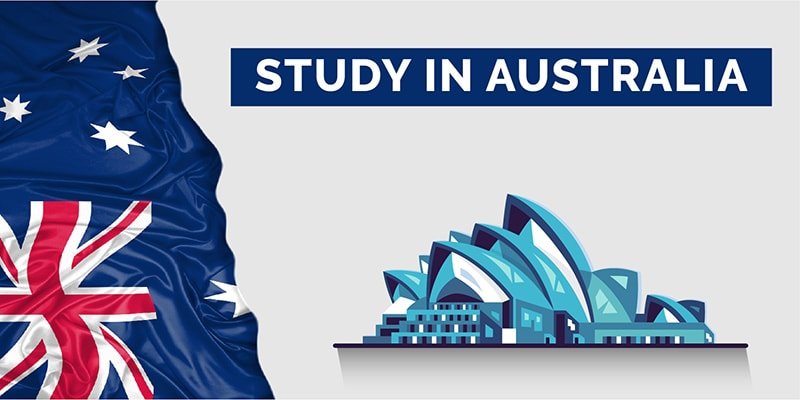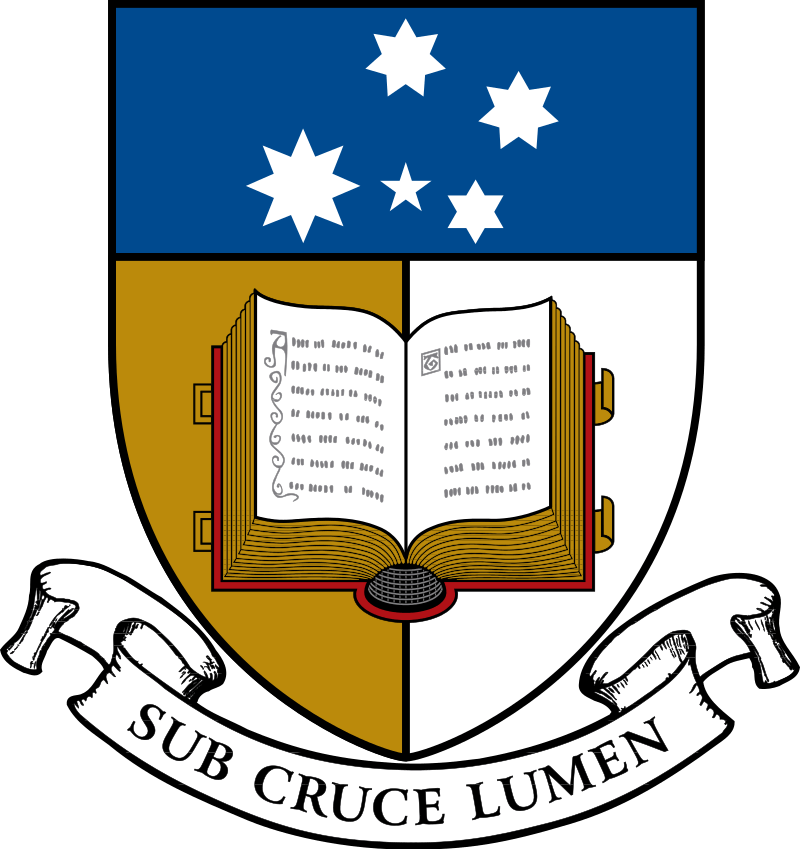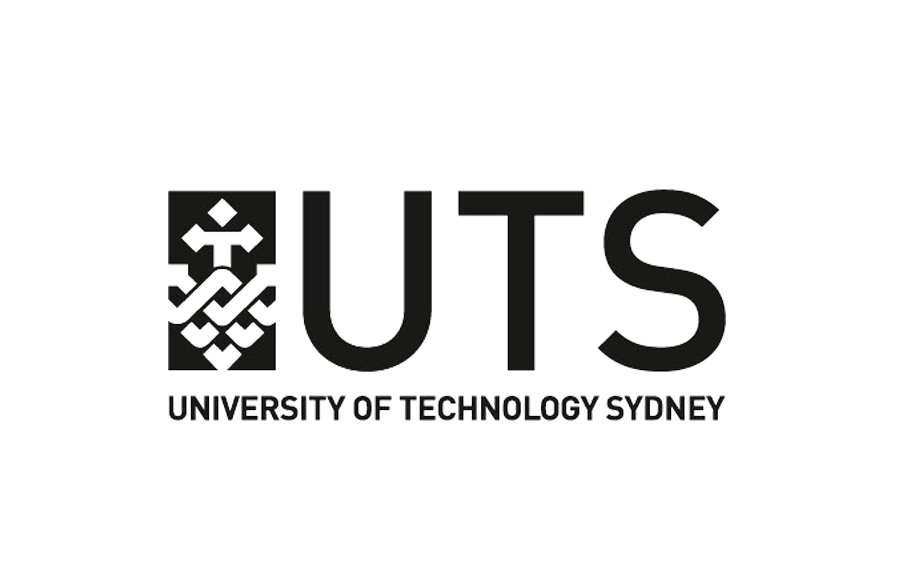- Flat No: #106, Lenaine Estate Residency, Gunfoudary Abids, Hyderabad.
- info@xpediaoverseaseducation.com
- +91 9014643703 , +91 8008156243
- Mon _ Sat: 9.00 to 18.00
Updates:
STUDY IN AUSTRALIA
Study In Australia

Study in Australia has a lot to offer to international students wishing to embark on their study overseas journey there. The country's modern lifestyle and native culture is highly regarded. Ranked among the best in the world are Higher Education Institutions in Australia. International students wishing to study in Australia are given a CRICOS code which indicates that it has global recognition. Higher education in the country offers courses that are shorter in duration and more intensive, thereby, providing value for money. Courses for students to study in Australia are offered across various academic fields viz. Medicine, Journalism and Media, Earth Sciences, Business and Management, Law, Actuarial Science, Humanities, Social Studies, among others. The duration of Master's courses in Australia is 1, 1.5 to 2 years. An Indian degree of 12+3 is acceptable for the course. The Visa Process in Australia is streamlined, straightforward, and fair. Xpedia, an Australian Education Consultant has been an accredited member of AAERI since its foundation.
Top 10 Universities In Australia for International Students
Education Cost in Australia
International students who study in Australia are offered an excellent value and high-quality education at competitive costs. Foreign students have to pay tuition fees. However, these costs differ depending on the course of study or university; therefore, average costs are mentioned below and are to be used only for reference. From about AUD19,000 for a Graduate Certificate to AUD28,000 annually for a Doctorate degree, the fees at Australian universities differ. The courses that are more costly usually have strong laboratory or computer components. Vocational education and training providers in Australia offer a wide plethora of courses in Australia.
Australia provides top quality education which is comparable to be best. In comparison to thestudy in UK and study in USA, the cost of study in Australia is comparatively much cheaper. Higher education in the country offers shorter and more intensive courses compared to those available in other countries thereby providing value for money and in turn, reducing costs of living.
The estimated yearly tuition fees (in AUD) and Course duration: Undergraduate- 3 to 5 years and Postgraduate- 1 to 2 years. Approx. fees for UG courses is A$ 22000- 24000 and PG courses in Australia is A$ 25000-30000 respectively.
Accommodation in Australia: Types
On-Campus: On Campus, accommodation includes college hostels that are self-catered or fully catered
Off-Campus: Off-Campus, accommodation includes renting an apartment or flat
Homestay: Students can stay with families near the university
Students are advised to apply for accommodation as early as possible.
Costs of Living In Australia
As study in Australia consultants, we estimate that the average cost an international student in Australia spends is about 18610 AUD annually on food, entertainment, accommodation, telephone, clothing, transport, global and domestic travel, and other incidental costs. While this is a realistic guide, it is important to remember that individual circumstances will vary by location, course and lifestyle.
Health Insurance
All international students who study in Australia should
have an Overseas Student Health Cover (OSHC) for themselves
as well as their dependents, wherever applicable, for the
desired stay period. Once the offer is accepted, one is
required to pay the premium amount. The current cost for
OSHC ranges between AUD 650-750 approx. yearly depending on
the course duration.
Top Courses in Australia
Australia boasts its top-notch education system and international students are offered an array of courses to opt from.Courses in Australia are offered through specialist institutions and universities in Australia. Indian students in Australia can study full-time or part-time. This enables them to study as per their schedule. Students in Australia opt for courses in Education, Management, Information Technology, Hospitality, Health, Business Administration, and Finance, among others. MBA in Australia is opted for by many students.
A vast array of courses and degrees are offered by universities in Australia that are as under:
Agriculture: Horticulture Business, Agriculture and
Forest
Administration And Law: Commerce, Marketing,
Economics, Management, HR, Accounting, Finance, and
Administration
Education: Early Childhood, Education Studies,
Special Education, Teaching
Engineering: One can specialize in Mining,
Electronics, Computer, Mechanical, Industrial, Mechatronics,
Aeronautical, Polymer, Civil, Automotive, Electrical,
Telecommunications, General Engineering, Environmental,
Structural, and Chemical Engineering.
Health Sciences: With specializations in Public
Health, Nutrition, Personal and Family Health Care,
Physiotherapy, Nursing, Pharmacy, Environmental Health,
Veterinary Science
Hospitality & Tourism: One can specialize in
Tourism Management, Commercial Cookery and Hotel Management
Humanities: Foreign Language Studies, Philosophy,
Psychology, English, History
Mathematics And Computing: Students can specialize in
Computer Based Information System, Mathematics &
Statistics and Computer Science
Science: Under Science, one can specialize in
Chemistry, Biotechnology, Science Pharmacology,
Environmental Science
Visual And Performing Arts: With specializations in
Crafts, Art, Music, Graphic Arts, Performing Arts, Fashion
Design
Communications: One can specialize in Media, Public
Relations, Journalism, and Corporate Communication
IT: Offers specializations in Information Systems,
Software Development, Networking, Security, Information
Technology
Social Studies: Students opting for Social Studies
can choose from the following specializations viz. Sport And
Recreation, Behavioural Studies, Sociology, Geography,
Welfare And Counselling
Career Opportunities in Australia
Industries
To promote and sustain economic activity, Industries in
Australia work side by side. Industries such as Agriculture,
Business Services, Education, Technology, Finance, Tourism,
Construction, Tourism, Hospitality, Manufacturing, among
others, contribute to the national income.
Work And Migration
Students pursuing Masters in Australia or those who
complete two years of study in Australia will be given a
Skilled-Graduate Visa i.e. a two-year Visa. Students are
given the opportunity to work full time or can even improve
their English or earn extra points for General Skilled
Migrant Policy for PR during this time period. Students with
a Skilled Graduate Visa can apply for any of the following
visa categories within the 18 months duration.
Provisional Skilled - Regional Sponsored visa (Subclass
487)
Permanent Skilled - Independent visa (Subclass 885)
Permanent Skilled - Sponsored visa (Subclass 886)
Students can also apply for an employer-sponsored visa at
any time.
Part-Time Employment
Students who study in Australia can work part-time
during course sessions for 40 hours per fortnight and full
time during the course break. Students can earn
approximately 15 to 16 AUD per hour on average. Casual jobs
are also available as PT work options and one can earn AUD15
to AUD20/hour.
Post Study Work Right
1. Students who have completed Bachelor's and Master's
degrees of atleast two academic years are offered two years
Post Study Work rights.
2. Students who complete Master by Research are offered
three years PSW rights
3. PhD graduates are offered four years of PSW rights
Scholarships in Australia
A scholarship is also known as an award of financial aid is offered to students to further pursue his or her education. Universities in Australia offer a number of scholarships to their students. Not just this, scholarships are also offered by governments, benefactors, colleges, and private organizations. Scholarships are awarded based upon various criteria, thereby reflecting the values and purposes or the specific nature of the scholarship.
Students can pursue courses in Australia upon paying the full fees. There are, however, students undertaking postgraduate research in areas of particular concern to Australia who may apply for an Overseas Postgraduate Research Scholarships (OPRS). About 300 scholarships are offered annually to students from all over the world. Exceptional students are offered research grants or scholarships by their university on an occasional basis. The Government of Australia offers an International Postgraduate Research Scholarship (IPRS) scheme for postgraduate research students.
Part Scholarships based on academic excellence are available at the Bachelor’s and master’s levels. Institutions in Australia offer their own scholarships.
Application Procedure in Australia
Colleges in Australia: Admission Intakes
Admissions to Australian universities take place in two intakes viz. February and July. On the other hand, several universities in Australia offer intakes in September and November. Students should start making applications approximately 7-8 months before the intake. Australian universities generally take around 4-6 weeks to process the applications.
Documents Required for Study in Australia
Indian students who wish to study in Australia are required
to
submit the following documents while making an
application:
• Updated Resume
• Statement of Purpose
• Attested copies of 10th, 12th, and graduate mark
sheets
• Passing certificates from 10th onwards
• Two Letters of Recommendation from colleges/employers
• Passport copy or birth certificate
• IELTS / PTE / TOEFL score sheet.
Entry Requirements / Eligibility Criteria for Studying in Australia
Undergraduate - Bachelors
Students pursuing a Bachelor's in Australia should possess a
good academic record in High School Certificate or 12 years
of schooling
Computing and Engineering courses in Australia will require
Mathematics and /or Science as pre-requisites
An overall IELTS score of 6.0/ 79 TOEFL / 50-58 PTE
Postgraduate - Masters
To pursue a Master's degree in Australia, students should
have a good academic record in their Bachelor’s Degree from
a recognized university
Any work experience in the field adds weightage.
To study MBA in Australia some Universities may require
students to have work experience along with their Bachelor's
Degree
An overall IELTS score of 6.5/ 90 TOEFL / 59-64 PTE
Education System in Australia
Australian Qualification Framework (AQF) An integrated nationwide system of qualifications exists in Australia, known as the Australian Qualification Framework (AQF). This is recognized by the Australian Government. Under the Australian Qualification Framework, students can easily move from one level of study to the next and also receive credit for their previous studies. It brings together the quality offered at different levels.
Types of Institutions in Australia
University
Australia is home to 41 universities. Universities in
Australia range in size from around 3,000 students to
50,000
students. Out of the 41 universities in Australia, 39
are
run by the government. Australian universities offer
undergraduate as well as postgraduate programs in
traditional and modern subject areas such as innovative
courses in IT, Electronic Business, and Science.
Academicians in Australia have won prestigious awards,
including several Nobel Prizes, and are involved in
ground-breaking research.
Courses Available At the Undergraduate And Graduate Level:
Awarded courses differ to a vast extent from the
higher
education sector in the form of entry requirements,
duration, and method of assessment. Universities in
Australia offer the following awards:
• Doctoral Degree
• Master's Degree Coursework / taught programme
• Master by Research Degree
• Graduate Diploma / Graduate Certificate
• Bachelor's Degree
• TAFE Certificate III & IV
• Diploma / Advanced Diploma
Types of Degrees in Australia
Undergraduate Studies:
Bachelor programmes varying from 3-5 years are
available
across all faculties of Arts, Commerce, Science, IT
Postgraduate Studies:
Students opting to study master's in Australia are
offered a
vast array of choices. The individual universities
offer
different strengths and capabilities, providing a
diverse
base for research for students. Universities in
Australia
pride themselves on a strong research base and
state-of-the-art equipment to their universities.
Vocational Education And Training In Australia
(VET):
Australia offers a plethora of vocational education
and
training courses. Xpedia, as Australian education
consultants, receive an increasing number of
students each
year that choose the TAFE option, either as a mode
of
training and qualifying for a highly skilled job in
business, the arts, or industry, or as an
alternative
pathway to seek admission to university degree
studies.
International students who choose to undertake TAFE
studies
are offered a number of advantages but lower fees is
one of
the primary criteria.
Australian Visa Process
International students who choose to study in Australia are required to know certain important things. These include knowing what visas to apply for and the visa application requirements, the students' obligations while they study in Australia, and information about complying with the conditions of your visa.
There are various types of visas available for visiting Australia. Numerous factors such as the duration of one's stay, one's passport, one's current location, and the purpose of one's visit to the country play an important in determining the type of Visa one may be able to get.
As Australian education consultants, we recommend that students intending to study in Australia will require to apply for the Student Visa (subclass 500).
Foreign Affairs and Defence sponsored students, as well as school sector students, have been given specific information. In addition, more information such as genuine temporary entrant requirements, English language requirements, Health insurance, financial capacity requirements, and changing courses are available for students. Students wishing to pursue more than one course might be able to package their courses.
Eligibility Criteria:
Before applying for this visa, one should be accepted by an educational institution or university in Australia for full-time study. Students below the age of 18 should organize appropriate welfare arrangements for the period till he/she stays in the country.
Visa Process
Step 1 – Compilation of documents
Step 2- Preparation of documents
Step 3 – Making Payment
Step 4 – Visa Application
Step 5 – Providing other necessary documentation
Step 6 – Tracking and managing one's application
Step 7 - Visa decision
FAQ's - Study in Australia
How will Xpedia Overseas Education help me study in Australia?
Xpedia, as an Australian education consultant, since the past 30 years, has been sending students to Australia and other countries for the pursuit for their higher education. Xpedia Overseas Education has trained professional counselors with experience and expertise to assist and guide students. All our offices provide students with the following:
• Offering FREE counseling and information on the different
courses and institutions
• Application Forms - Brochures - Guides etc
• Admission Assistance
• Visa Counseling
• Arranging for the travel and accommodation
• Procuring Residential Facilities with Indians for students
going abroad
• Aids in the following: Insurance, Bank A/c in Australia,
Student Loan, Flight ticket Booking
FAQs:
Are Indian students who study in Australia eligible for scholarships?
Overseas students who study in Australia are provided an outstanding education, knowledgeable staff, and a broad selection of courses to enormous research and career prospects. There are numerous scholarships available for students to apply for while studying in Australia, provided they meet the financial conditions.
Are Australian Degrees Recognized Worldwide? Why Is GMAT And GRE Not Asked For By All Australian Universities?
Universities in Australia have global recognition. GMAT or GRE exams are mainly for American universities. Students appearing for these exams are judged as per American standards and thus Australian universities do not insist upon students going for these exams. Degrees in Australia are recognized in India and vice versa. However, it may be asked by some Universities to assess the overall ability of the student.
How Long Does Visa Application Procedure Require?
The Australian High Commission takes an average time of 4-12 weeks for the visa procedure. This however, depends on the individuals background. As an Australian education consultant, Xpedia recommends students apply for their visas at least three months before the commencement of their course.
How Do You Know Which University Is The Best In Australia?
There are a number of universities in Australia, all of which are regulated under the Vice Chancellors Committee, following the code of ethics and thus, Australian universities cannot be rated. Students generally follow the market trends and study MBA in Australia or BBA, MIT, etc., but it would be unfair to judge universities as one can only compare the course structure and faculty.
Can I Find A Job Placement After My Course Completion?
All students, upon completion of two years of study in Australia, are eligible for a Skilled Graduate Visa, enabling them to work for up to two years.
How Do I Know If I Am Eligible For The Permanent Residency (PR)?
For a student to be eligible for the Permanent Residency, he/she has to cover up to 60 points. These points can be earned based on the following: English language proficiency, a combination of the following course, age, time period of one's study in Australia, studying in a regional area, working part-time. For further details and to test your points visit the following website: www.immi.gov.au
What Salary Can I Expect When I Start Working In Australia?
The average starting salary a student can earn ranges between AUD40,000- AUD60,000 per year.
My Education Has Been In English. Do I Still Need To Appear For The IELTS?
IELTS- the English Language Proficiency Test is a mandatory visa requirement. However, universities in Australia also accept TOEFL and PTE.
What Are The Visa Possibilities For My Spouse/Dependent?
The spouse or dependent of a Student- Visa holder in Australia is also granted a Dependent Visa as well as a valid work permit for the same time period as the primary applicant. However, this is applicable for those who pursue master in the country.
How much does studying in Australia cost for Indian students?
Various factors, including the study levels, programmes, universities, locations, etc. determine the costs of studying in Australia. The price varies from AUD 18,000 to 50,000 per year. Indian students can expect to pay between $15 lakh and $20 lakh on average for their education in Australia.
How much does it cost to study an MBA in Australia?
Among graduate degrees, an MBA is one of the most sought-after options. The typical MBA program will cost between $20,000 and $100,000 to complete. Your MBA program may be more inexpensive thanks to flexible program options and scholarship opportunities.
Why do many students choose to study in Australia over other countries?
Leading universities, breathtaking scenery, energetic cities, and a number of oceans are just a few of the factors that influence the decision of many international students to study in Australia. While the prospect of studying abroad may seem a little intimidating, the benefits in terms of academic and personal growth can be tremendous.
Can international students work while studying in Australia?
The benefits of working while studying are numerous, and all international students studying in Australia are permitted to do so. Students with a valid student visa (subclass 500) are permitted to work up to 40 hours per fortnight during the academic year and an unlimited number of hours during course breaks.
-
Universities
-
Education Cost
International students who study in Australia are offered an excellent value and high-quality education at competitive costs. Foreign students have to pay tuition fees. However, these costs differ depending on the course of study or university; therefore, average costs are mentioned below and are to be used only for reference. From about AUD19,000 for a Graduate Certificate to AUD28,000 annually for a Doctorate degree, the fees at Australian universities differ. The courses that are more costly usually have strong laboratory or computer components. Vocational education and training providers in Australia offer a wide plethora of courses in Australia.
Australia provides top quality education which is comparable to be best. In comparison to thestudy in UK and study in USA, the cost of study in Australia is comparatively much cheaper. Higher education in the country offers shorter and more intensive courses compared to those available in other countries thereby providing value for money and in turn, reducing costs of living.
The estimated yearly tuition fees (in AUD) and Course duration: Undergraduate- 3 to 5 years and Postgraduate- 1 to 2 years. Approx. fees for UG courses is A$ 22000- 24000 and PG courses in Australia is A$ 25000-30000 respectively.
Accommodation in Australia: Types
On-Campus: On Campus, accommodation includes college hostels that are self-catered or fully catered
Off-Campus: Off-Campus, accommodation includes renting an apartment or flat
Homestay: Students can stay with families near the university
Students are advised to apply for accommodation as early as possible.
Costs of Living In Australia
As study in Australia consultants, we estimate that the average cost an international student in Australia spends is about 18610 AUD annually on food, entertainment, accommodation, telephone, clothing, transport, global and domestic travel, and other incidental costs. While this is a realistic guide, it is important to remember that individual circumstances will vary by location, course and lifestyle.
Health Insurance
All international students who study in Australia should have an Overseas Student Health Cover (OSHC) for themselves as well as their dependents, wherever applicable, for the desired stay period. Once the offer is accepted, one is required to pay the premium amount. The current cost for OSHC ranges between AUD 650-750 approx. yearly depending on the course duration. -
Top Courses
Australia boasts its top-notch education system and international students are offered an array of courses to opt from.Courses in Australia are offered through specialist institutions and universities in Australia. Indian students in Australia can study full-time or part-time. This enables them to study as per their schedule. Students in Australia opt for courses in Education, Management, Information Technology, Hospitality, Health, Business Administration, and Finance, among others. MBA in Australia is opted for by many students.
A vast array of courses and degrees are offered by universities in Australia that are as under:
Agriculture: Horticulture Business, Agriculture and Forest
Administration And Law: Commerce, Marketing, Economics, Management, HR, Accounting, Finance, and Administration
Education: Early Childhood, Education Studies, Special Education, Teaching
Engineering: One can specialize in Mining, Electronics, Computer, Mechanical, Industrial, Mechatronics, Aeronautical, Polymer, Civil, Automotive, Electrical, Telecommunications, General Engineering, Environmental, Structural, and Chemical Engineering.
Health Sciences: With specializations in Public Health, Nutrition, Personal and Family Health Care, Physiotherapy, Nursing, Pharmacy, Environmental Health, Veterinary Science
Hospitality & Tourism: One can specialize in Tourism Management, Commercial Cookery and Hotel Management
Humanities: Foreign Language Studies, Philosophy, Psychology, English, History
Mathematics And Computing: Students can specialize in Computer Based Information System, Mathematics & Statistics and Computer Science
Science: Under Science, one can specialize in Chemistry, Biotechnology, Science Pharmacology, Environmental Science
Visual And Performing Arts: With specializations in Crafts, Art, Music, Graphic Arts, Performing Arts, Fashion Design
Communications: One can specialize in Media, Public Relations, Journalism, and Corporate Communication
IT: Offers specializations in Information Systems, Software Development, Networking, Security, Information Technology
Social Studies: Students opting for Social Studies can choose from the following specializations viz. Sport And Recreation, Behavioural Studies, Sociology, Geography, Welfare And Counselling -
Career Opportunities
Industries
To promote and sustain economic activity, Industries in Australia work side by side. Industries such as Agriculture, Business Services, Education, Technology, Finance, Tourism, Construction, Tourism, Hospitality, Manufacturing, among others, contribute to the national income.Work And Migration
Students pursuing Masters in Australia or those who complete two years of study in Australia will be given a Skilled-Graduate Visa i.e. a two-year Visa. Students are given the opportunity to work full time or can even improve their English or earn extra points for General Skilled Migrant Policy for PR during this time period. Students with a Skilled Graduate Visa can apply for any of the following visa categories within the 18 months duration.Provisional Skilled - Regional Sponsored visa (Subclass 487)
Permanent Skilled - Independent visa (Subclass 885)
Permanent Skilled - Sponsored visa (Subclass 886)
Students can also apply for an employer-sponsored visa at any time.Part-Time Employment
Students who study in Australia can work part-time during course sessions for 40 hours per fortnight and full time during the course break. Students can earn approximately 15 to 16 AUD per hour on average. Casual jobs are also available as PT work options and one can earn AUD15 to AUD20/hour.Post Study Work Right
1. Students who have completed Bachelor's and Master's degrees of atleast two academic years are offered two years Post Study Work rights.
2. Students who complete Master by Research are offered three years PSW rights
3. PhD graduates are offered four years of PSW rights -
Scholarships
A scholarship is also known as an award of financial aid is offered to students to further pursue his or her education. Universities in Australia offer a number of scholarships to their students. Not just this, scholarships are also offered by governments, benefactors, colleges, and private organizations. Scholarships are awarded based upon various criteria, thereby reflecting the values and purposes or the specific nature of the scholarship.
Students can pursue courses in Australia upon paying the full fees. There are, however, students undertaking postgraduate research in areas of particular concern to Australia who may apply for an Overseas Postgraduate Research Scholarships (OPRS). About 300 scholarships are offered annually to students from all over the world. Exceptional students are offered research grants or scholarships by their university on an occasional basis. The Government of Australia offers an International Postgraduate Research Scholarship (IPRS) scheme for postgraduate research students.
Part Scholarships based on academic excellence are available at the Bachelor’s and master’s levels. Institutions in Australia offer their own scholarships.
-
Application Procedure
Colleges in Australia: Admission Intakes
Admissions to Australian universities take place in two intakes viz. February and July. On the other hand, several universities in Australia offer intakes in September and November. Students should start making applications approximately 7-8 months before the intake. Australian universities generally take around 4-6 weeks to process the applications.
Documents Required for Study in Australia
Indian students who wish to study in Australia are required to submit the following documents while making an application:
• Updated Resume
• Statement of Purpose
• Attested copies of 10th, 12th, and graduate mark sheets
• Passing certificates from 10th onwards
• Two Letters of Recommendation from colleges/employers
• Passport copy or birth certificate
• IELTS / PTE / TOEFL score sheet.
Entry Requirements / Eligibility Criteria for Studying in Australia
Undergraduate - Bachelors Students pursuing a Bachelor's in Australia should possess a good academic record in High School Certificate or 12 years of schooling
Computing and Engineering courses in Australia will require Mathematics and /or Science as pre-requisites
An overall IELTS score of 6.0/ 79 TOEFL / 50-58 PTE
Postgraduate - Masters
To pursue a Master's degree in Australia, students should have a good academic record in their Bachelor’s Degree from a recognized university
Any work experience in the field adds weightage.
To study MBA in Australia some Universities may require students to have work experience along with their Bachelor's Degree
An overall IELTS score of 6.5/ 90 TOEFL / 59-64 PTE
-
Education System
Australian Qualification Framework (AQF) An integrated nationwide system of qualifications exists in Australia, known as the Australian Qualification Framework (AQF). This is recognized by the Australian Government. Under the Australian Qualification Framework, students can easily move from one level of study to the next and also receive credit for their previous studies. It brings together the quality offered at different levels.
Types of Institutions in Australia
University
Australia is home to 41 universities. Universities in Australia range in size from around 3,000 students to 50,000 students. Out of the 41 universities in Australia, 39 are run by the government. Australian universities offer undergraduate as well as postgraduate programs in traditional and modern subject areas such as innovative courses in IT, Electronic Business, and Science. Academicians in Australia have won prestigious awards, including several Nobel Prizes, and are involved in ground-breaking research.
Courses Available At the Undergraduate And Graduate Level:
Awarded courses differ to a vast extent from the higher education sector in the form of entry requirements, duration, and method of assessment. Universities in Australia offer the following awards:
• Doctoral Degree
• Master's Degree Coursework / taught programme
• Master by Research Degree
• Graduate Diploma / Graduate Certificate
• Bachelor's Degree
• TAFE Certificate III & IV
• Diploma / Advanced DiplomaTypes of Degrees in Australia
Undergraduate Studies:
Bachelor programmes varying from 3-5 years are available across all faculties of Arts, Commerce, Science, ITPostgraduate Studies:
Students opting to study master's in Australia are offered a vast array of choices. The individual universities offer different strengths and capabilities, providing a diverse base for research for students. Universities in Australia pride themselves on a strong research base and state-of-the-art equipment to their universities.Vocational Education And Training In Australia (VET):
Australia offers a plethora of vocational education and training courses. Xpedia, as Australian education consultants, receive an increasing number of students each year that choose the TAFE option, either as a mode of training and qualifying for a highly skilled job in business, the arts, or industry, or as an alternative pathway to seek admission to university degree studies. International students who choose to undertake TAFE studies are offered a number of advantages but lower fees is one of the primary criteria. -
Visa
International students who choose to study in Australia are required to know certain important things. These include knowing what visas to apply for and the visa application requirements, the students' obligations while they study in Australia, and information about complying with the conditions of your visa.
There are various types of visas available for visiting Australia. Numerous factors such as the duration of one's stay, one's passport, one's current location, and the purpose of one's visit to the country play an important in determining the type of Visa one may be able to get.
As Australian education consultants, we recommend that students intending to study in Australia will require to apply for the Student Visa (subclass 500).
Foreign Affairs and Defence sponsored students, as well as school sector students, have been given specific information. In addition, more information such as genuine temporary entrant requirements, English language requirements, Health insurance, financial capacity requirements, and changing courses are available for students. Students wishing to pursue more than one course might be able to package their courses.
Eligibility Criteria:
Before applying for this visa, one should be accepted by an educational institution or university in Australia for full-time study. Students below the age of 18 should organize appropriate welfare arrangements for the period till he/she stays in the country.
Visa Process
Step 1 – Compilation of documents
Step 2- Preparation of documents
Step 3 – Making Payment
Step 4 – Visa Application
Step 5 – Providing other necessary documentation
Step 6 – Tracking and managing one's application
Step 7 - Visa decision
-
FAQ's
How will Xpedia Overseas Education help me study in Australia?
Xpedia, as an Australian education consultant, since the past 30 years, has been sending students to Australia and other countries for the pursuit for their higher education. Xpedia Overseas Education has trained professional counselors with experience and expertise to assist and guide students. All our offices provide students with the following:
• Offering FREE counseling and information on the different courses and institutions
• Application Forms - Brochures - Guides etc
• Admission Assistance
• Visa Counseling
• Arranging for the travel and accommodation
• Procuring Residential Facilities with Indians for students going abroad
• Aids in the following: Insurance, Bank A/c in Australia, Student Loan, Flight ticket BookingFAQs:
Are Indian students who study in Australia eligible for scholarships?
Overseas students who study in Australia are provided an outstanding education, knowledgeable staff, and a broad selection of courses to enormous research and career prospects. There are numerous scholarships available for students to apply for while studying in Australia, provided they meet the financial conditions.
Are Australian Degrees Recognized Worldwide? Why Is GMAT And GRE Not Asked For By All Australian Universities?
Universities in Australia have global recognition. GMAT or GRE exams are mainly for American universities. Students appearing for these exams are judged as per American standards and thus Australian universities do not insist upon students going for these exams. Degrees in Australia are recognized in India and vice versa. However, it may be asked by some Universities to assess the overall ability of the student.
How Long Does Visa Application Procedure Require?
The Australian High Commission takes an average time of 4-12 weeks for the visa procedure. This however, depends on the individuals background. As an Australian education consultant, Xpedia recommends students apply for their visas at least three months before the commencement of their course.
How Do You Know Which University Is The Best In Australia?
There are a number of universities in Australia, all of which are regulated under the Vice Chancellors Committee, following the code of ethics and thus, Australian universities cannot be rated. Students generally follow the market trends and study MBA in Australia or BBA, MIT, etc., but it would be unfair to judge universities as one can only compare the course structure and faculty.
Can I Find A Job Placement After My Course Completion?
All students, upon completion of two years of study in Australia, are eligible for a Skilled Graduate Visa, enabling them to work for up to two years.
How Do I Know If I Am Eligible For The Permanent Residency (PR)?
For a student to be eligible for the Permanent Residency, he/she has to cover up to 60 points. These points can be earned based on the following: English language proficiency, a combination of the following course, age, time period of one's study in Australia, studying in a regional area, working part-time. For further details and to test your points visit the following website: www.immi.gov.au
What Salary Can I Expect When I Start Working In Australia?
The average starting salary a student can earn ranges between AUD40,000- AUD60,000 per year.
My Education Has Been In English. Do I Still Need To Appear For The IELTS?
IELTS- the English Language Proficiency Test is a mandatory visa requirement. However, universities in Australia also accept TOEFL and PTE.
What Are The Visa Possibilities For My Spouse/Dependent?
The spouse or dependent of a Student- Visa holder in Australia is also granted a Dependent Visa as well as a valid work permit for the same time period as the primary applicant. However, this is applicable for those who pursue master in the country.
How much does studying in Australia cost for Indian students?
Various factors, including the study levels, programmes, universities, locations, etc. determine the costs of studying in Australia. The price varies from AUD 18,000 to 50,000 per year. Indian students can expect to pay between $15 lakh and $20 lakh on average for their education in Australia.
How much does it cost to study an MBA in Australia?
Among graduate degrees, an MBA is one of the most sought-after options. The typical MBA program will cost between $20,000 and $100,000 to complete. Your MBA program may be more inexpensive thanks to flexible program options and scholarship opportunities.
Why do many students choose to study in Australia over other countries?
Leading universities, breathtaking scenery, energetic cities, and a number of oceans are just a few of the factors that influence the decision of many international students to study in Australia. While the prospect of studying abroad may seem a little intimidating, the benefits in terms of academic and personal growth can be tremendous.
Can international students work while studying in Australia?
The benefits of working while studying are numerous, and all international students studying in Australia are permitted to do so. Students with a valid student visa (subclass 500) are permitted to work up to 40 hours per fortnight during the academic year and an unlimited number of hours during course breaks.











